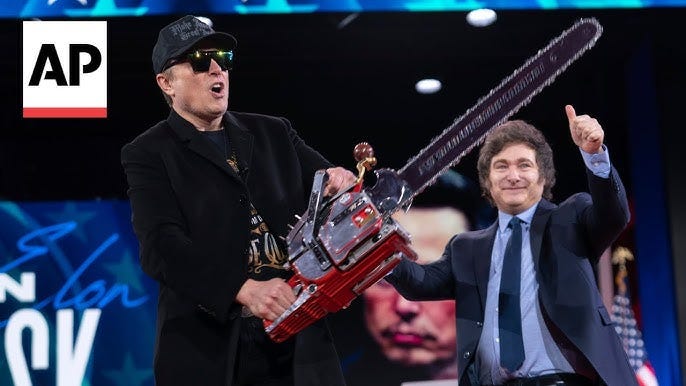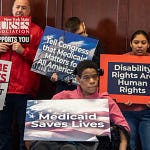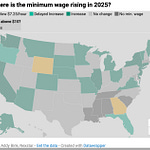Welcome to The Poverty Trap, a newsletter and podcast for people who are fed up with the inequality baked into America’s system and want to individually and collectively make change.
An 18 minute clip from The Daily Show: Jon Stewart interviewing Mathew Desmond, Pulitzer Prize winning author of Evicted, and most recently author of Poverty, By America. Well worth your time if you want to better understand some of the reasons why we still have substantial poverty in the richest country on earth.
“The average family in the bottom 20% of the income distribution, the poorest families, they are receiving about $26,000 a year from the government. The average family in the top 20%, the richest families, are receiving about $35,000 a year from the government. This is the true nature of our welfare state. They [the richest families] are getting about 40% more than the poorest families. Then we have the, like, audacity, the shamelessness, to look at a program that would reduce childhood poverty or make sure everyone had access to a dentist, and be like, ‘Gosh, how can we afford it?’ “ Mathew Desmond interview with Jon Stewart, March 3, 2025.1
The question I posed is this: “Is it really that hard to eliminate poverty in America?” I believe the answer is a resounding “no”. But I also believe there must be a profound, cultural and moral shift in attitudes about the people who have fallen into poverty, for whatever reasons, and those pushed into homelessness and poverty by our laws and policy choices, before meaningful change can be made. After all, the reason why America’s wealthiest receive 40% more in subsidies from the federal government than the poorest is because it is designed that way through laws, which reflect the choices of our elected officials, and ultimately reflect our voting choices. But we can change the design of our system through our vote.
In his acceptance lecture for the Nobel Peace Prize in late 1964, Dr. Martin Luther King, Jr. said:
“There is no deficit in human resources; the deficit is in human will.” MLK, Jr. in his Nobel Peace Prize lecture presented December 11, 1964, where he addresses the failure to end poverty.
And sixty-one years later, there apparently remains a deficit in human will.
I had the pleasure of attending Mathew Desmond’s talk at the Columbus, Ohio main library a few months ago. He presented a fascinating discussion to an overflow crowd that included much more than poverty numbers in America; he presented statistics that showed how and why our social and economic system allows this extreme poverty to happen, more than in any industrialized country, and despite our country’s great wealth. Desmond agrees that we need to expand not contract our social safety net, and our government could do much more to reign in worker exploitation and policies that allow predatory lending, for example, while increasing the minimum wage and empowering unions.
But he also describes scenarios where the upper middle class and the rich could start to actually think how they, as individuals and families, contribute to the scourge of poverty. The video below is a great, hour and a half discussion with Desmond and the Urban Institute, but in the first 11 minutes, Desmond describes everyday actions we can take, that may be quite uncomfortable, but are necessary if we want to shift the discussion about poverty in our communities and our larger society. In fact, it’s practically a requirement for those who have more than they need to stand up for those who don’t even have the bare necessities. Unfortunately, it is easy to forget that nearly 38 million people in the United States live at or below the federal poverty level.
In an article for Time published in 2023, Mark R. Rank, the Herbert S. Hadley professor of social welfare at Washington University in St. Louis, makes the case that America looks at poverty “all wrong”, saying we view poverty through the myths we’ve been taught about the poor, and in a larger sense, the American Dream—that we are all capable of “pulling ourselves up by our bootstraps” and supporting ourselves. And if you haven’t been able to achieve that status, you have made poor life choices—you are the “other”, far removed from mainstream American society. To the contrary, Rank points out the following facts:
… between the ages of 20 and 75, 75 % of all Americans will spend at least one year in or near poverty? Or that only 10% of the poor live in high poverty neighborhoods? Or that, according the U.S. Census Bureau, two thirds of the poor classify themselves as White? Or that most individuals in poverty remain poor for only one or two years?
Rank also discusses, as does Mathew Desmond, that the myths surrounding the poor are rooted in racism; people continue to believe, contrary to fact, that the majority of those receiving “welfare” are Black or other minorities. The 38 million people in this country who live below the federal poverty line are just too lazy to work hard enough to support themselves and their families—never mind the $7.25 federal minimum wage, the trampling of unions, soaring prices for goods and services, unaffordable housing and the myriad other systemic factors that work against the poor.
There is another force poised to hit low income Americans even harder than myths and perceptions about poverty, and it will strike an even larger portion of the American population. It will not be only those who are poor and disabled who are upended, but the elderly and every segment of what is left of the middle class.
In the fall of 2024, the National Association of Social Workers published its analysis of Project 2025, a 900 page document written by the Heritage Foundation outlining its right wing agenda to consolidate power in the president and cabinet and at the same time, dismantle federal government agencies. This analysis of Project 2025 and its devastating impact on the poor, middle class, women and minorities turned out to be 100% correct:
Once the fine print was made clear, many Americans began to realize that the plan poses a threat to return Americans, especially those from communities of color and the low to moderate income population, to the late 19th/mid-20th century, a time of robber barons, Jim Crow laws, and a lack of a social safety net…
As promised, Elon Musk, President Trump’s “special employee” in charge of the surreal, “Department of Government Efficiency” is taking a literal chainsaw to federal agencies and social safety net programs, including Social Security. Photo Credit: AP File
The politics and policy choices of those we chose to elect have become even clearer now, but they were right in front of us when we voted, and certainly discussed and explained before the election.
True individual freedom cannot exist without economic security and independence. People who are hungry and out of a job are the stuff of which dictatorships are made. President Franklin Delano Roosevelt, 1944. (Thanks to
for posting this prescient warning on March 20, 2025)
______________________________________________
What was your first reaction when it became clear that our government chooses to subsidize the rich more than the poor? When it became clear that our social safety net, including social security, is on the chopping block? Please leave your thoughts and ideas in the Comment Section below.
This post goes out to both free and paid subscribers, but if you are not already a paid subscriber and value this effort and our growing community, please consider upgrading to a paid membership. Thank you! And a hearty “thank you” to my latest free and paid subscribers—I appreciate your support!
In this 2023 interview with PBS, Desmond discusses how we subsidize America’s wealthiest with government benefits, social insurance, and tax breaks.













Share this post